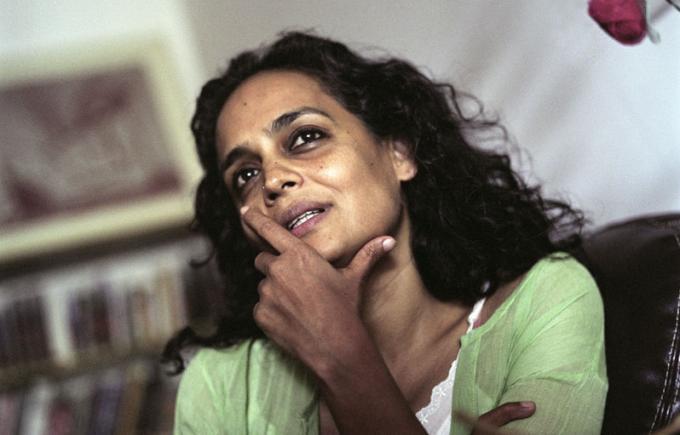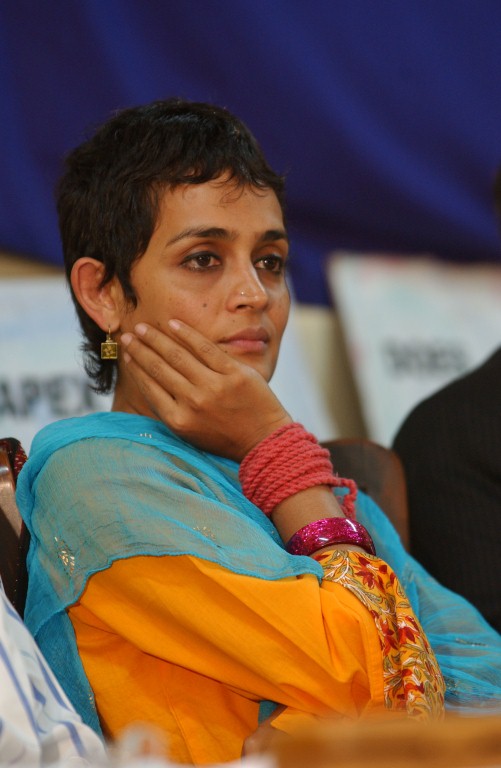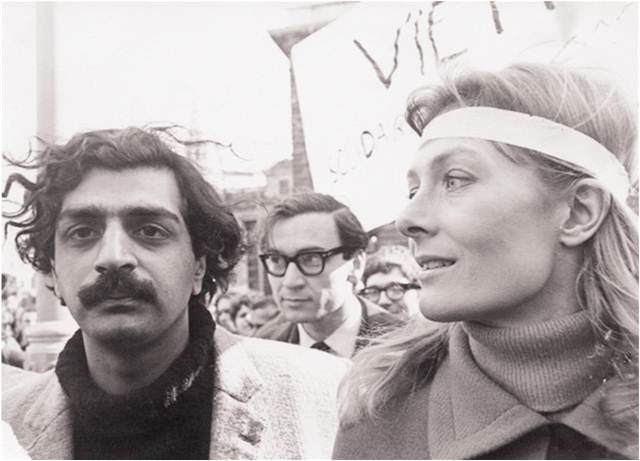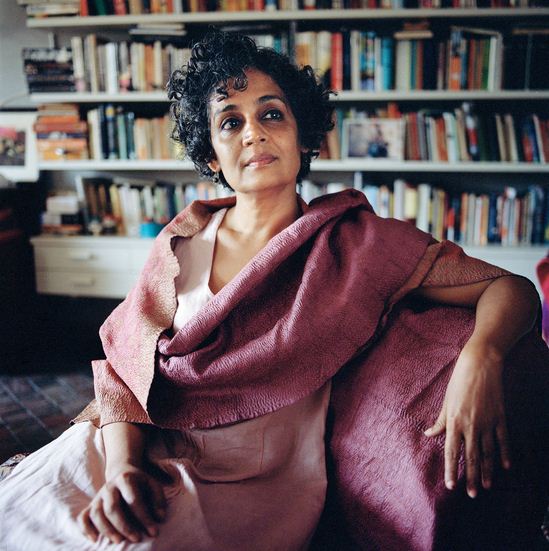This article appeared in the February 9, 2004 edition of The Nation. It was adapted from Arundhati Roy’s speech to the opening plenary of the World Social Forum in Mumbai.
 /Arundhati Roy, photo © Dinesh Khanna/
/Arundhati Roy, photo © Dinesh Khanna/
“In January 2003 thousands of us from across the world gathered in Porto Alegre in Brazil and declared–reiterated–that ‘Another World Is Possible.’ A few thousand miles north, in Washington, George W. Bush and his aides were thinking the same thing.
Our project was the World Social Forum. Theirs–to further what many call the Project for the New American Century.
In the great cities of Europe and America, where a few years ago these things would only have been whispered, now people are openly talking about the good side of imperialism and the need for a strong empire to police an unruly world. The new missionaries want order at the cost of justice. Discipline at the cost of dignity. And ascendancy at any price. Occasionally some of us are invited to ‘debate’ the issue on ‘neutral’ platforms provided by the corporate media. Debating imperialism is a bit like debating the pros and cons of rape. What can we say? That we really miss it?
In any case, New Imperialism is already upon us. It’s a remodeled, streamlined version of what we once knew. For the first time in history, a single empire with an arsenal of weapons that could obliterate the world in an afternoon has complete, unipolar, economic and military hegemony. It uses different weapons to break open different markets. There isn’t a country on God’s earth that is not caught in the cross-hairs of the American cruise missile and the IMF checkbook. Argentina’s the model if you want to be the poster boy of neoliberal capitalism, Iraq if you’re the black sheep. Poor countries that are geopolitically of strategic value to Empire, or have a ‘market’ of any size, or infrastructure that can be privatized, or, God forbid, natural resources of value–oil, gold, diamonds, cobalt, coal–must do as they’re told or become military targets. Those with the greatest reserves of natural wealth are most at risk. Unless they surrender their resources willingly to the corporate machine, civil unrest will be fomented or war will be waged.
In this new age of empire, when nothing is as it appears to be, executives of concerned companies are allowed to influence foreign policy decisions. The Center for Public Integrity in Washington found that at least nine out of the thirty members of the Bush Administration’s Defense Policy Board were connected to companies that were awarded military contracts for $76 billion between 2001 and 2002. George Shultz, former Secretary of State, was chairman of the Committee for the Liberation of Iraq. He is also on the board of directors of the Bechtel Group. When asked about a conflict of interest in the case of war in Iraq he said, ‘I don’t know that Bechtel would particularly benefit from it. But if there’s work to be done, Bechtel is the type of company that could do it. But nobody looks at it as something you benefit from.’ In April 2003, Bechtel signed a $680 million contract for reconstruction.
This brutal blueprint has been used over and over again across Latin America, in Africa and in Central and Southeast Asia. It has cost millions of lives. It goes without saying that every war Empire wages becomes a Just War. This, in large part, is due to the role of the corporate media. It’s important to understand that the corporate media don’t just support the neoliberal project. They are the neoliberal project. This is not a moral position they have chosen to take; it’s structural. It’s intrinsic to the economics of how the mass media work.
Most nations have adequately hideous family secrets. So it isn’t often necessary for the media to lie. It’s all in the editing–what’s emphasized and what’s ignored. Say, for example, India was chosen as the target for a righteous war. The fact that about 80,000 people have been killed in Kashmir since 1989, most of them Muslim, most of them by Indian security forces (making the average death toll about 6,000 a year); the fact that in February and March of 2002 more than 2,000 Muslims were murdered on the streets of Gujarat, that women were gang-raped and children were burned alive and 150,000 driven from their homes while the police and administration watched and sometimes actively participated; the fact that no one has been punished for these crimes and the government that oversaw them was re-elected…all of this would make perfect headlines in international newspapers in the run-up to war.
Next thing we know, our cities will be leveled by cruise missiles, our villages fenced in with razor wire, US soldiers will patrol our streets, and Narendra Modi, Pravin Togadia or any of our popular bigots will, like Saddam Hussein, be in US custody having their hair checked for lice and the fillings in their teeth examined on prime-time TV.
✎
But as long as our ‘markets’ are open, as long as corporations like Enron, Bechtel, Halliburton and Arthur Andersen are given a free hand to take over our infrastructure and take away our jobs, our ‘democratically elected’ leaders can fearlessly blur the lines between democracy, majoritarianism and fascism.
Our government’s craven willingness to abandon India’s proud tradition of being non-aligned, its rush to fight its way to the head of the queue of the Completely Aligned (the fashionable phrase is ‘natural ally’–India, Israel and the United States are ‘natural allies’), has given it the leg room to turn into a repressive regime without compromising its legitimacy.
A government’s victims are not only those it kills and imprisons. Those who are displaced and dispossessed and sentenced to a lifetime of starvation and deprivation must count among them too. Millions of people have been dispossessed by ‘development’ projects. In the past fifty-five years, big dams alone have displaced between 33 million and 55 million in India. They have no recourse to justice. In the past two years there have been a series of incidents in which police have opened fire on peaceful protesters, most of them Adivasi and Dalit. When it comes to the poor, and in particular Dalit and Adivasi communities, they get killed for encroaching on forest land, and killed when they’re trying to protect forest land from encroachments–by dams, mines, steel plants and other ‘development’ projects. In almost every instance in which the police opened fire, the government’s strategy has been to say the firing was provoked by an act of violence. Those who have been fired upon are immediately called militants.
Across the country, thousands of innocent people, including minors, have been arrested under the Prevention of Terrorism Act and are being held in jail indefinitely and without trial. In the era of the War against Terror, poverty is being slyly conflated with terrorism. In the era of corporate globalization, poverty is a crime. Protesting against further impoverishment is terrorism. And now our Supreme Court says that going on strike is a crime. Criticizing the court is a crime too, of course. They’re sealing the exits.
Like Old Imperialism, New Imperialism relies for its success on a network of agents–corrupt local elites who service Empire. We all know the sordid story of Enron in India. The then-Maharashtra government signed a power purchase agreement that gave Enron profits that amounted to 60 percent of India’s entire rural development budget. A single American company was guaranteed a profit equivalent to funds for infrastructural development for about 500 million people!
Unlike in the old days, the New Imperialist doesn’t need to trudge around the tropics risking malaria or diarrhea or early death. New Imperialism can be conducted on e-mail. The vulgar, hands-on racism of Old Imperialism is outdated. The cornerstone of New Imperialism is New Racism.
The best allegory for New Racism is the tradition of ‘turkey pardoning’ in the United States. Every year since 1947, the National Turkey Federation has presented the US President with a turkey for Thanksgiving. Every year, in a show of ceremonial magnanimity, the President spares that particular bird (and eats another one). After receiving the presidential pardon, the Chosen One is sent to Frying Pan Park in Virginia to live out its natural life. The rest of the 50 million turkeys raised for Thanksgiving are slaughtered and eaten on Thanksgiving Day. ConAgra Foods, the company that has won the Presidential Turkey contract, says it trains the lucky birds to be sociable, to interact with dignitaries, school children and the press. (Soon they’ll even speak English!)
That’s how New Racism in the corporate era works. A few carefully bred turkeys–the local elites of various countries, a community of wealthy immigrants, investment bankers, the occasional Colin Powell or Condoleezza Rice, some singers, some writers (like myself)–are given absolution and a pass to Frying Pan Park. The remaining millions lose their jobs, are evicted from their homes, have their water and electricity connections cut, and die of AIDS. Basically they’re for the pot. But the Fortunate Fowls in Frying Pan Park are doing fine. Some of them even work for the IMF and the WTO–so who can accuse those organizations of being antiturkey? Some serve as board members on the Turkey Choosing Committee–so who can say that turkeys are against Thanksgiving? They participate in it! Who can say the poor are anti-corporate globalization? There’s a stampede to get into Frying Pan Park. So what if most perish on the way?
✎
As part of the project of New Racism we also have New Genocide. New Genocide in this new era of economic interdependence can be facilitated by economic sanctions. New Genocide means creating conditions that lead to mass death without actually going out and killing people. Denis Halliday, who was the UN humanitarian coordinator in Iraq between 1997 and 1998 (after which he resigned in disgust), used the term genocide to describe the sanctions in Iraq. In Iraq the sanctions outdid Saddam Hussein’s best efforts by claiming more than half a million children’s lives.
In the new era, apartheid as formal policy is antiquated and unnecessary. International instruments of trade and finance oversee a complex system of multilateral trade laws and financial agreements that keep the poor in their bantustans anyway. Its whole purpose is to institutionalize inequity. Why else would it be that the US taxes a garment made by a Bangladeshi manufacturer twenty times more than a garment made in Britain? Why else would it be that countries that grow cocoa beans, like the Ivory Coast and Ghana, are taxed out of the market if they try to turn it into chocolate? Why else would it be that countries that grow 90 percent of the world’s cocoa beans produce only 5 percent of the world’s chocolate? Why else would it be that rich countries that spend over a billion dollars a day on subsidies to farmers demand that poor countries like India withdraw all agricultural subsidies, including subsidized electricity? Why else would it be that after having been plundered by colonizing regimes for more than half a century, former colonies are steeped in debt to those same regimes and repay them some $382 billion a year?
For all these reasons, the derailing of trade agreements at Cancún was crucial for us. Though our governments try to take the credit, we know that it was the result of years of struggle by many millions of people in many, many countries. What Cancún taught us is that in order to inflict real damage and force radical change, it is vital for local resistance movements to make international alliances. From Cancún we learned the importance of globalizing resistance.
No individual nation can stand up to the project of corporate globalization on its own. Time and again we have seen that when it comes to the neoliberal project, the heroes of our times are suddenly diminished. Extraordinary, charismatic men, giants in the opposition, when they seize power and become heads of state, are rendered powerless on the global stage. I’m thinking here of President Lula of Brazil. Lula was the hero of the World Social Forum last year. This year he’s busy implementing IMF guidelines, reducing pension benefits and purging radicals from the Workers’ Party. I’m thinking also of the former president of South Africa, Nelson Mandela. Within two years of taking office in 1994, his government genuflected with hardly a caveat to the Market God. It instituted a massive program of privatization and structural adjustment that has left millions of people homeless, jobless and without water and electricity.
Why does this happen? There’s little point in beating our breasts and feeling betrayed. Lula and Mandela are, by any reckoning, magnificent men. But the moment they cross the floor from the opposition into government they become hostage to a spectrum of threats–most malevolent among them the threat of capital flight, which can destroy any government overnight. To imagine that a leader’s personal charisma and a c.v. of struggle will dent the corporate cartel is to have no understanding of how capitalism works or, for that matter, how power works. Radical change cannot be negotiated by governments; it can only be enforced by people.
At the World Social Forum some of the best minds in the world come together to exchange ideas about what is happening around us. These conversations refine our vision of the kind of world we’re fighting for. It is a vital process that must not be undermined. However, if all our energies are diverted into this process at the cost of real political action, then the WSF, which has played such a crucial role in the movement for global justice, runs the risk of becoming an asset to our enemies. What we need to discuss urgently is strategies of resistance. We need to aim at real targets, wage real battles and inflict real damage. Gandhi’s salt march was not just political theater. When, in a simple act of defiance, thousands of Indians marched to the sea and made their own salt, they broke the salt tax laws. It was a direct strike at the economic underpinning of the British Empire. It was real. While our movement has won some important victories, we must not allow nonviolent resistance to atrophy into ineffectual, feel-good, political theater. It is a very precious weapon that must be constantly honed and reimagined. It cannot be allowed to become a mere spectacle, a photo opportunity for the media.
It was wonderful that on February 15 last year, in a spectacular display of public morality, 10 million people on five continents marched against the war on Iraq. It was wonderful, but it was not enough. February 15 was a weekend. Nobody had to so much as miss a day of work. Holiday protests don’t stop wars. George Bush knows that. The confidence with which he disregarded overwhelming public opinion should be a lesson to us all. Bush believes that Iraq can be occupied and colonized as Afghanistan has been, as Tibet has been, as Chechnya is being, as East Timor once was and Palestine still is. He thinks that all he has to do is hunker down and wait until a crisis-driven media, having picked this crisis to the bone, drops it and moves on. Soon the carcass will slip off the bestseller charts, and all of us outraged folks will lose interest. Or so he hopes.
✎
This movement of ours needs a major, global victory. It’s not good enough to be right. Sometimes, if only in order to test our resolve, it’s important to win something. In order to win something, we need to agree on something. That something does not need to be an overarching preordained ideology into which we force-fit our delightfully factious, argumentative selves. It does not need to be an unquestioning allegiance to one or another form of resistance to the exclusion of everything else. It could be a minimum agenda.
If all of us are indeed against imperialism and against the project of neoliberalism, then let’s turn our gaze on Iraq. Iraq is the inevitable culmination of both. Plenty of antiwar activists have retreated in confusion since the capture of Saddam Hussein. Isn’t the world better off without Saddam Hussein? they ask timidly.
Let’s look this thing in the eye once and for all. To applaud the US Army’s capture of Saddam Hussein, and therefore in retrospect justify its invasion and occupation of Iraq, is like deifying Jack the Ripper for disemboweling the Boston Strangler. And that after a quarter-century partnership in which the Ripping and Strangling was a joint enterprise. It’s an in-house quarrel. They’re business partners who fell out over a dirty deal. Jack’s the CEO.
So if we are against imperialism, shall we agree that we are against the US occupation and that we believe the United States must withdraw from Iraq and pay reparations to the Iraqi people for the damage that the war has inflicted?
How do we begin to mount our resistance? Let’s start with something really small. The issue is not about supporting the resistance in Iraq against the occupation or discussing who exactly constitutes the resistance. (Are they old killer Baathists, are they Islamic fundamentalists?)
We have to become the global resistance to the occupation.
Our resistance has to begin with a refusal to accept the legitimacy of the US occupation of Iraq. It means acting to make it materially impossible for Empire to achieve its aims. It means soldiers should refuse to fight, reservists should refuse to serve, workers should refuse to load ships and aircraft with weapons. It certainly means that in countries like India and Pakistan we must block the US government’s plans to have Indian and Pakistani soldiers sent to Iraq to clean up after them.
I suggest we choose by some means two of the major corporations that are profiting from the destruction of Iraq. We could then list every project they are involved in. We could locate their offices in every city and every country across the world. We could go after them. We could shut them down. It’s a question of bringing our collective wisdom and experience of past struggles to bear on a single target. It’s a question of the desire to win.
The Project for the New American Century seeks to perpetuate inequity and establish American hegemony at any price, even if it’s apocalyptic. The World Social Forum demands justice and survival.
For these reasons, we must consider ourselves at war.”
• • •
For more Arundhati Roy wisdom, see:
Arundhati Roy: There’s A Lot of Money in Poverty
Arundhati Roy: The President Took The Salute
Arundhati Roy: Feminism & Foundations, Burkas & Botox
 //photo © Stuart Freedman/In pictures/Corbis//
//photo © Stuart Freedman/In pictures/Corbis//






